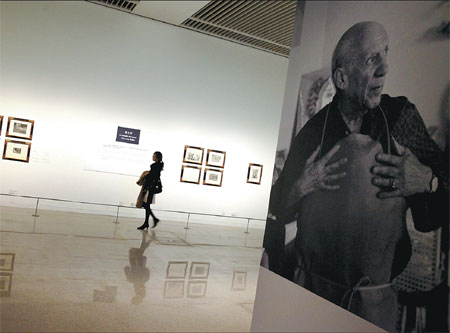Unexpected Picasso
Richly emotional and sometimes erotic, a set of 100 etchings on exhibit at the National Museum of China reflects both the artist's versatility and a milestone in 20th-century art, Lin Qi reports.
They are described as "a walk through Picasso's mind" and "the center of the labyrinth" to the master's inner self by curators at the British Museum. The acquisition of a complete set of them is priceless for public institutions and private collectors.
More than seven decades after they were produced, the 100 etchings that make up the Vollard Suite are being shown in China.
The set was assembled by the Official Credit Institute Foundation of Spain, reputed to be one of the most important collections of Spanish art of the 20th century. Its current display at the National Museum of China also celebrates the 40th anniversary of Sino-Spanish diplomatic relations.
For Chinese viewers who mostly know about Picasso's surrealistic works, especially the celebrated Guernica, the set, created in the neoclassical style, will shed new light on their understanding of the gamut of Picasso's rich emotions, his obsessions with art and eroticism in particular.
The Vollard Suite took Picasso seven years to finish (1930-37) and marks a pinnacle of not only the artist's career but also the etchings of the 20th century.
The 100 plates fall into six parts, while they need to be appreciated in their entirety to be a reflection of Picasso's life changes over time, as well as his anxieties over the worsening political situation at the dawn of World War II.
For example, the Minotaur (the half-man-and-half-bull creature in Greek mythology) featured in Picasso's art is a reoccurring image in the set. He first appears as a tender, gloomy lover and later becomes a blind, weak loser.
Art critics suggest it indicates Picasso's marital vicissitudes juggling between his wife, Olga Khokhlova, and Marie-Therese Walter, his mistress and muse 28 years his junior.
The Vollard Suite is a study in etching for Picasso and the artist used a number of techniques, including aquatinting, dry point and hot embossing.
Vollard Suite gives viewers the feeling of looking down a small hallway of Picasso's artistic and personal life, says Alicia Gomet, Spanish curator from the OCI museum.
"Picasso carried out a profound self-examination of his contradictory feelings and impulses, in a way much like writing visual diaries. The set is a representative testament to his creative eruption when in the 1930s he experimented with different art styles," she says.
After developing Cubism, Picasso achieved gradual maturity in handling all kinds of techniques and art languages. However, he turned to the classical presentation when producing the suite. Critics complained that he moved backward from the modernist trend and compromised with the order.
"I've been reading Francoise Gilot's book Vida con Picasso (Life with Picasso) recently, in which she mentioned 64-year-old Picasso once talked about the Vollard Suite," says Manuel Valencia Alonso, Spanish ambassador to China.
Gilot, a French painter, had a decade-long affair with Picasso and mothered two of his children.
"Picasso was quoted as saying: 'It all happens on the mountainous Creta Island in the Mediterranean Sea where the Minotaur resides. The Minotaur places works of the best painters and sculptors everywhere in his home. He likes to be surrounded by beauties, so he forced the island's fishermen to seduce beautiful women elsewhere to Creta. When the daytime heat fades away, the Minotaur plays host to artists and their models at his place. Accompanied by the music, they feast with delicious seafood and drink champagne, till their sorrows are gradually replaced by infinite joys'.
"Turning to a puzzled-looking Gilot who was in her early 20s, Picasso said, 'I know everything (I said) sounds like a mess. But don't you understand (from what I said) what does genius mean?'"
The set fully expresses the complexity of Picasso's unique persona; the Minotaur is taken as an incarnation of the great Spanish artist, speaking for his loneliness and twisted inner world, the ambassador says.
The set was commissioned by and named after Ambroise Vollard (1866-1939), and contains three portraits of him. Picasso exchanged the set for paintings of Cezanne and Renoir.
A legendary dealer and collector of avant-garde art, Vollard established his reputation by representing many notable artists, such as Cezanne, Gauguin, Van Gogh and Renoir.
Vollard mounted Picasso's first exhibition in Paris in 1901. Their association was a long-lived one, though Vollard didn't become Picasso's contracted dealer.
"They maintained quite a good friendship. For Picasso, Vollard was more than a gallerist - he was a friend, and that's why the portraits of Vollard made by Picasso were so important," Gomet says.
"But in an artistic way, Picasso was more comfortable with Daniel-Henry Kahnweiler, who was his real gallerist."
Art historians say Vollard failed to recognize Picasso's full potential as he ignored Picasso's ventures into Cubism and Abstraction.
Contact the writer at linqi@chinadaily.com.cn.
linqi@chinadaily.com.cn
|
The China debut of the Vollard Suite offers a rare chance for Chinese viewers to get a close look at Picasso's artistic and personal life. Jiang Dong / China Daily |



















